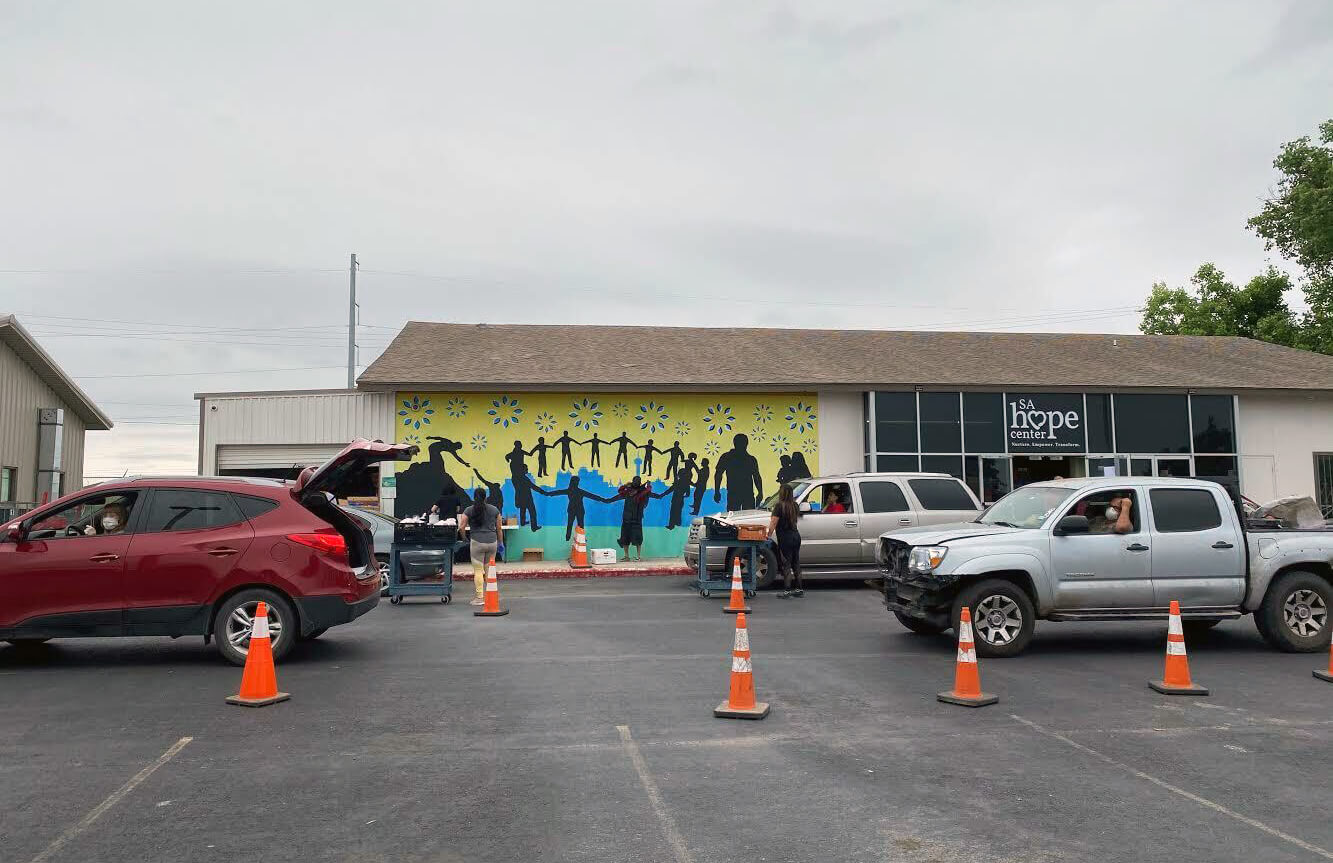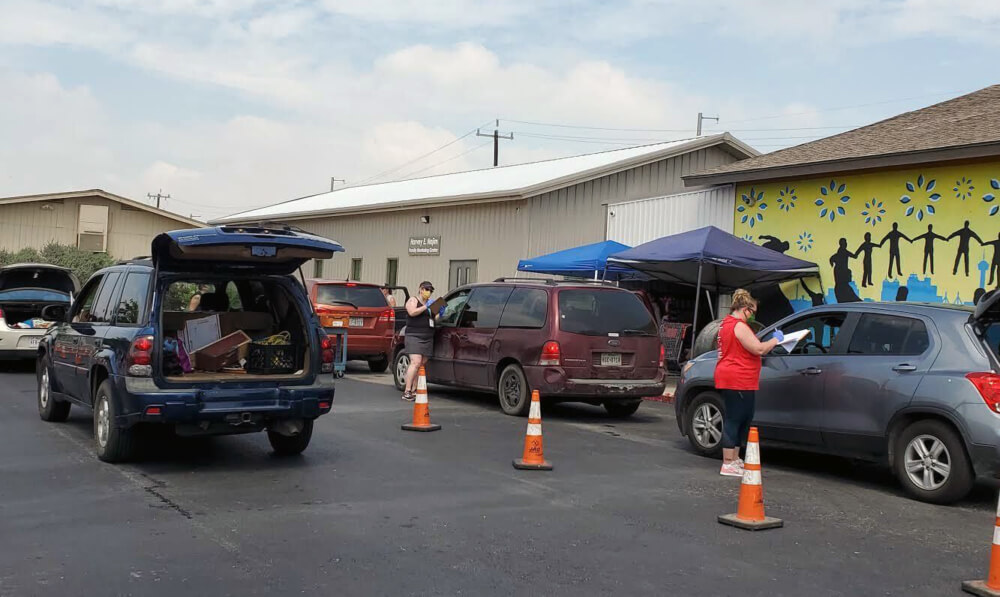
Last Friday, a sea of cars flooded the Alamodome parking lot as 2,000 people waited in line for food at a mega-distribution site of the San Antonio Food Bank. Of those needing food, a staggering 70 percent showed up for the first time—many of whom told the Food Bank they usually came only to donate or volunteer. Now, they were here because they needed food.
Aerial images from San Antonio Food Bank events like that have gone viral and received national media attention. But that’s not all that’s been happening locally. Within hours of the COVID-19 pandemic making its way here, nonprofits, philanthropists, and community leaders moved into a rapid response mode and joined forces to provide direct relief to San Antonio families.
As of April 17, $3.2 million in COVID-19 Response Fund relief and 103 grants have been awarded to San Antonio nonprofits serving special populations in San Antonio. The funds are helping abused children, people with disabilities, children in foster care, immigrants, older adults, veterans, youth, and those struggling with homelessness. Grantees include organizations serving fifteen of the city’s most impoverished ZIP codes.
The H. E. Butt Foundation was one of the first partners to join the San Antonio Area Foundation (SAAF) in launching the COVID-19 Response Fund. That is worth noting not because this is a race, but because moments like this highlight why relationships matter—including relationships between organizations.
In the last few years, through our Community Engagement initiatives, we’ve worked closely with all sorts of area nonprofits, spending copious amounts of time getting to know their work and building solid relationships with their leaders and the funders who support them.
When a crisis hits, relationships pave the way for aligned organizations to join forces and execute quick decisions.
“When we expanded our work into San Antonio a few years ago, our strategy was to figure out how we could leverage the most amount of good. We started with taking a very relational approach,” said Perri Rosheger, the H. E. Butt Foundation’s vice president of community engagement and communications.
”It’s really made a difference in how we can show up during a crisis, and we’re heartened and encouraged by the work these nonprofits have done. We want to continue to support and amplify their efforts,” she added.
Patricia Mejia, San Antonio Area Foundation’s vice president of community engagement and impact, said her relationship with the H. E. Butt Foundation played an instrumental role in quickly getting critical resources out to organizations.
“You can’t move fast around strategy during a crisis if you don’t have an existing relationship,” said Mejia. “The reason why this has worked so well is because Perri Rosheger and I, along with so many others, have such an incredible amount of respect and trust for each other,” she said.
SAAF worked hard to simplify the application process for nonprofits, promising all applicants they would receive answers within 5-7 business days. Mejia says the amount of money awarded to nonprofits is a huge deal, but it’s only a small part of the story.
“I think the real story here is just how much folks care and immediately stepped up to help in any way possible; they quickly transitioned to provide critical support services such as immediate food relief, housing, employment assistance, mental health, sobriety help, and education programs,” said Mejia.
Sitting from her San Antonio home office, Mejia became emotional when sharing a story of a mom who, determined to make sure her daughter didn’t fall behind in school, sat in a local nonprofit parking lot while her daughter accessed its WiFi so she could finish her homework.
This story hit home for Mejia, who says her own mother reminded her of the mom in the parking lot. “I’m only here because my mom was a straight-up hustler,” she said, adding that, “it’s not what poor people don’t do, it’s what they do in spite of.”
Stories like these also came from other nonprofits like SA Hope Center, which accessed COVID-19 Response funds within a week of application to help provide services to the community.
Before the pandemic, SA Hope Center provided food security to about 567 total families within a 30-day period. When COVID-19 hit San Antonio, the need to feed families became insurmountable. Moving quickly, the Hope Center submitted their COVID-19 Response application within 24 hours of the fund opening its application process.
Next, they immediately launched new critical, on-site emergency food distribution and delivery services to help families. Since March 16, the nonprofit has provided more than 6,684 families on-site emergency food distribution, conducted 140 home food deliveries for people who were unable to travel outside of their homes, and given out approximately 20 packs of diapers and 903 kid lunches.
“We’re so thankful we got funds right away, and extremely grateful that SAAF made the application process relatively easy,” said Megan Legacy, executive director of the SA Hope Center.
Prospera Housing Community Services, a nonprofit that provides affordable housing communities across South Texas, has also stepped up to serve the community after being awarded $50,000 from the COVID-19 Response Fund. They now provide rental and utility support for people adversely affected by COVID-19.
Scott Ackerson, executive director of Strategic Relationships and Services, Prospera Housing Community Services, says working with residents who can’t pay their rent has been a top priority. They currently service 14 properties and 1,741 multifamily units in San Antonio, and they have implemented a “no-evictions” policy during the pandemic.
Since March 25, Prospera has assisted 946 people with food, conducted more than 2,100 wellness checks, and worked with 207 families to provide rental and utilities assistance.
Prospera is still working to obtain additional funding.
“All of the fundraising and grant efforts are in high gear, and we’ve been churning about two to three applications a day,” said Ackerson. “We’re carefully evaluating our financial position every day with the executive leadership team trying to make decisions. So far, this month we’ve been able to meet all of our financial obligations,” he said.
In spite of losing a few volunteers, Ackerson says people are still coming together to help each other in a time of need. “It’s been an all-hands-on-deck mentality,” he said, recounting a story of how one resident sewed face masks for everyone on one of the properties.
SA Hope Center and Prospera Housing Community Services are participating organizations in the H. E. Butt Foundation’s Capacity Building program. There are also hundreds of other nonprofits and COVID-19 Response Fund grantees working on the frontlines to help communities in need.

When asked about the future, Ackerson wasn’t as optimistic. “Residents’ needs are being met now,” he said, “but the crash is likely to come in the next month or two.”
Even with a swift and effective local response, significant challenges still lie ahead, especially for so many families who were already living on the margins and struggling to make ends meet.
The Family Independence Initiative (FII) is working to address this need by providing rapid-response emergency cash assistance to eligible households through #GiveTogetherNow, a national relief fund they created with the philanthropic community, Stand Together. The H. E. Butt Foundation was the first foundation in San Antonio to make an initial investment.
Since April 7, FII has distributed more than 1,200 one-time direct $500 cash transfers to San Antonio families totaling more than $700,000. And because FII is absorbing all overhead and operational costs, 100 percent of these funds will go directly to families.
“We are intentionally targeting families who are directly impacted by the inequities of our system,” said Ivanna Neri, site director for Family Independence Initiative-Austin. Neri says these families include people who will not benefit from the CARES Act, such as those who are living in a gig economy, have previous criminal records, as well as undocumented families, among other groups.
Although non-profit, philanthropy, and funding communities have already raised millions for San Antonio families, the city still struggles with the highest poverty rates in the nation and a chasm in resources and opportunities available between neighborhoods. Approximately one in five San Antonians live in poverty, according to 2018 U.S. Census data.
New data has yet to be released indicating how the COVID-19 pandemic has impacted San Antonio’s poverty rate, but it’s certain that the crisis exacerbates the problem.
To help your neighbors, consider these SA-based nonprofits for charitable giving.